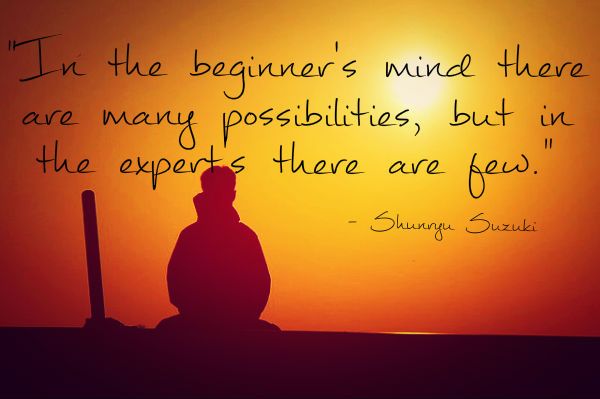Blueberries, the Beginner's Mind and the Art of Living

This article serves as a commentary on Leo Babatua’s article, How to Master the Art of Living, from his blog, Zen Habits:

In the article, Leo suggests the following hypothetical situation: Imagine you have a single blueberry on the table across from you. You reach over, put the blueberry in your mouth and begin to taste it. It tastes overripe – too mushy and sweet. Since this blueberry didn’t taste like others you have tasted before, your expectations are not met and you are disappointed.
Now, scenario two: you taste the blueberry, and it tastes exactly as you expect – plump, juicy and perfectly sweet – your expectations are met. Great. You move on and go about your day just the same as if nothing happened.
In case one, the blueberry was disappointing because it didn’t meet expectations. In case two, it was boring because it met expectations.
Do you see what we’re getting at here? Now here is the alternative approach that Leo suggests:
Eliminate all expectations.
Imagine you have never eaten a blueberry before, nor do you even know what a blueberry is. It is simply a small, circular, squishy, blue (and of course, edible) object in front of you. Now when you try it, you really pay attention to all its features – its texture, taste, smell, etc. You taste it… and it’s amazing! Because you have never before experienced this sensation, you are fascinated by it. This is what Leo calls the beginner’s mind – a mind free of expectations. In Zen Buddhism, this term is called shoshin, which is defined as having an attitude of openness, eagerness, and lack of preconceptions when studying a subject, even when studying at an advanced level.
“In the beginner’s mind there are many possibilities, but in the expert’s there are few.” – Shunryu Suzuki
The blueberry serves as a metaphor for anything in life: any experience, any situation, any interaction, anything that enters your mind and beyond. Imagine the countless benefits that mastering the beginner’s mind could bring about.
If you approach each moment, each task, each person, without expectations … and just see that moment or person as they are … then you will really see that moment. Really appreciate it. Experience it like you’ve never experienced anything before, because you haven’t.
This is the Art of Living.
Mastering this skill allows you to be fully connected to the present as you are completely in touch with the task at hand. You are able to live in the moment to the fullest extent. This heightened sense of awareness brings about appreciation, gratitude, thankfulness, happiness and more. All traits central to positive psychology, and traits that will only enhance your overall well-being and quality of life. What if you had this approach to everything you did?
I’m sure you have encountered the benefits of the beginner’s mind in your own life without even realizing it. Think back to that party you had been looking forward to for months. Well, the party came and went, and ended up being a letdown. While you did have a pretty good time, it didn’t live up to the hype. It wasn’t as good as you expected. In contrast, think back to the night you weren’t planning to go out… however, after your friends’ begging and pleading to go to the concert with them, you finally gave in. Much to your surprise, the band you have never heard of nor were ever interested in seeing blew you away. You went into the concert with a mind free of expectations, a beginner’s mind, and this allowed you to enjoy yourself even more.
How to master the beginner’s mind
As with any skill, mastery of the beginner’s mind requires practice and lots of it.
It means learning to be mindful of when you have these ideals, expectations, fantasies. It means learning to see the frustrations, anger, sadness, loneliness, irritations as signals of the expectations you have and didn’t notice.
Easy, right? Again, it takes time, but you will certainly begin to see the benefits the more and more you practice. Meaning you will slowly move closer and closer you get to mastering the Art of Living. Keep these tips in mind:
Live in the moment.
Empty your mind.
Start slow – one step at a time.
Learn to let go.
Embrace the journey.
Live life to the fullest – one moment at a time.
…
Big thanks to Leo Babatua for the inspiration.
Be sure to check out his amazing blog, Zen Habits, for more awesome content.


